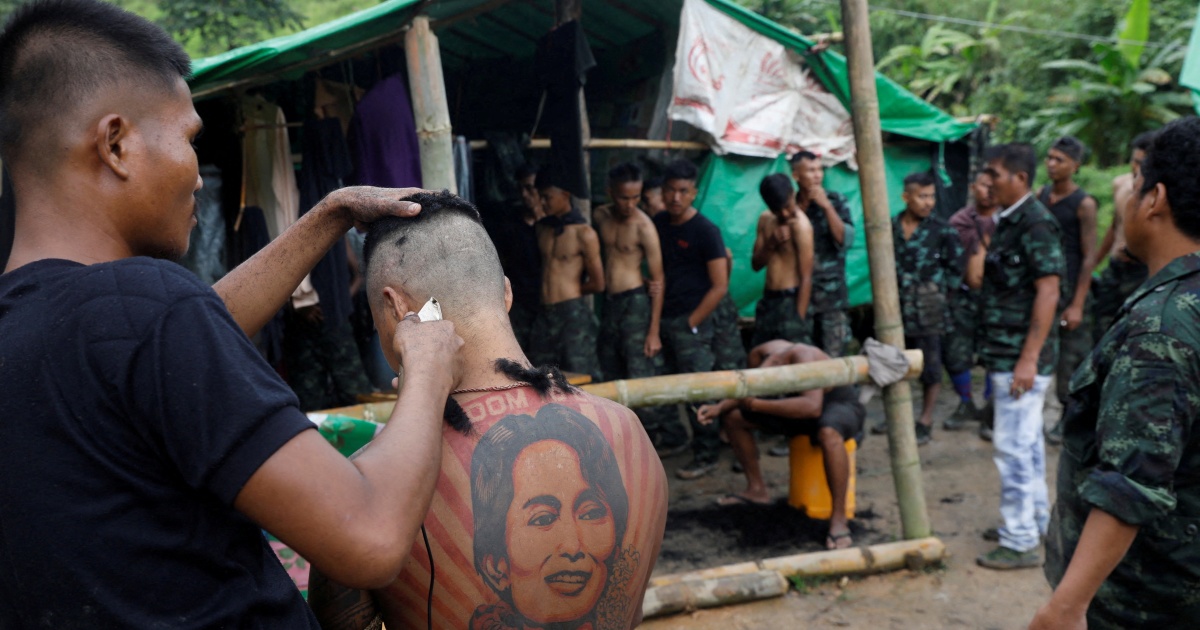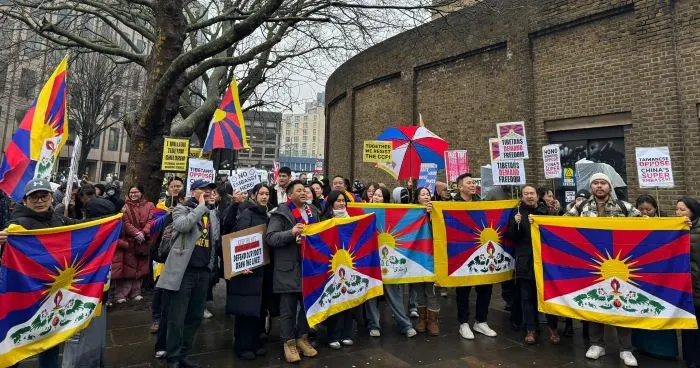How the Karen became crucial to Myanmar’s anti-coup resistance
Long fighting for its own independence, the Karen National Union is providing protection and training to those opposed to the military.
When the Myanmar military seized power on February 1 last year, the country’s oldest major ethnic armed group, the Karen National Union, was also one of the first to condemn the coup.
“We cannot accept the military taking power and detaining the country’s leaders. This is a massive obstacle and challenge in transitioning to democracy,” the KNU said in a statement the day after the power grab, accusing the military of violating its own 2008 constitution.
Soon afterwards, troops from the KNU’s armed wing, the Karen National Liberation Army, were seen providing security to protesters in Karen state, which lies along Myanmar’s border with Thailand. Elsewhere in the country, there was no such protection. The military embarked on a campaign of brutal violence against unarmed protesters, killing hundreds of people.
A year later, those images of the KNU protecting protesters have become symbolic of its role as the backbone of Myanmar’s new age of resistance. The group has provided military training to newly formed anti-coup armed groups, protection to political dissidents and safe passage for fugitives fleeing military-controlled areas.
“KNU people are very kind and very good at guerrilla warfare,” said Htet*, a 34-year-old resistance fighter who joined a network of armed groups in Yangon known as Urban Guerillas or UGs.
Armed KNLA troops provide security for a CDM protest march in Kawkareik, Karen State (KNLA Brigade 6), SE Myanmar, on Feb 19. The KNU/KNLA has previously publicly stated they will protect protesters. As reported by Khit Thit & others. #WhatsHappeningInMyanmar #karen pic.twitter.com/5sQNvspqkl — Matt W (@mattyrwalsh) February 19, 2021
Htet and all other sources interviewed for this story spoke to Al Jazeera in person from an undisclosed location.
Last year, Htet travelled from Yangon to KNU territory to receive training after watching soldiers shoot down unarmed, peaceful protesters. “The military arrested everyone and shot everyone. I needed to know how to fight back,” he said.
KNU spokesman Taw Nee says the new generation of resistance fighters are “very active and want revenge”. While he praises their motivation, he also says it has sometimes been difficult for the KNU to manage the massive influx of inexperienced fighters hailing from a hodgepodge of disorganised, nascent armed groups.
Taw Nee said that had led to some problems, like resistance fighters posting videos of battles on social media, accidentally exposing sensitive information, or doctors insisting on fighting on the front lines when they would be more useful as field medics.
“But they’ve improved a lot,” Taw Nee said, grinning like a proud father. “They have a lot of experience within a few months.”
Htet took that experience and put it to use when he returned to Yangon.
“There were 10 soldiers driving. We knew the route they usually took so we planted two bombs. After that, we heard a lot of screaming and then they start bang bang bang,” he said, describing a pipe bomb attack in Yangon’s Insein township.
In another incident, they planted multiple bombs in Hlegu township, killing about eight soldiers in the first blast. When two more came to investigate, they detonated a second, killing them as well.
When asked if he ever feels bad about killing soldiers, Htet shakes his head emphatically. “They are very bad people,” he insisted.
Protecting peaceful resistance
The KNU does not only support armed resistance but also provides support, protection and safe passage to peaceful political dissidents.
A police officer from Yangon, who deserted when ordered to use violence against protesters, told Al Jazeera that the KNU also welcomed him, despite his decision not to join the fighting.
The 25-year-old, who joined the police force when he was just 19, said he deserted on March 6 of last year as violent crackdowns began to escalate. “They ordered me to crack down on protesters and arrest people. My superior officer said to use rubber bullets and then to use real bullets,” he said.
He praised the KNU for providing him with food and a safe house, but said there were still some close calls. “The military attacked our camp and we had to run away,” he said, explaining that a few other dissidents were captured during the raid.
Prominent activist Thet Swe Win fled Yangon in March 2021, sheltering in KNU territory for about seven months. “I know myself, I wouldn’t be a good soldier, but I respect the armed struggle as a key component of the revolution,” he told Al Jazeera.
The tattoos that cover Thet Swe Win’s arms tell the story of peace but also resistance: block letters spelling HAKUNA MATATA [Swahili for ‘no trouble’ and popularised in the film The Lion King] a peace sign, a man with a hammer smashing a Nazi swastika.
Despite being one of the most vocal advocates for minority rights in Myanmar, even Thet Swe Win was not fully prepared for the reality of life for Karen people. “Our understanding before was too shallow,” he said.
Thet Swe Win says while there is a mutual animosity between the Bamar majority and the Karen, the ethnic minority are the ones who are oppressed. “The only Burmese they see are the soldiers. The ones who kill and loot and rape and burn their houses,” he said.
Thet Swe Win says in many rural areas, there are no schools or hospitals. He saw one pregnant woman being carried in a hammock up mountains through the jungle to the nearest clinic to give birth.
“Many have no proper houses, just bamboo shelters, because the soldiers always raid and burn their villages,” he said.
Karen state at war
Fighting exploded across Karen state in December of last year, when the military raided Lay Kay Kaw town. Soldiers arrested dozens of dissidents in hiding, including two elected lawmakers from the National League for Democracy, which secured a landslide victory in the country’s last elections in November 2020.
The military has cited unsubstantiated allegations of fraud in the poll in an attempt to justify its coup, but for the elected lawmakers their emphatic win is the source of their legitimacy.
They set up their own administration called the National Unity Government soon after being forced from office and a representative of the civilian government continues to hold Myanmar’s seat at the United Nations. The military, meanwhile, has declared the NUG and its anti-coup armed groups, known as People’s Defence Forces (PDFs), as “terrorist” organisations.
Since the raid on Lay Kay Kaw, fighting has spread to many other parts of the state. Taw Nee says there are clashes nearly every day, with tens of thousands of civilians displaced.
Taw Nee says morale within the Myanmar military is “very, very low” and claims fighting would be over soon if the military did not have air support.
Taw Nee says most of the PDFs operating in Karen State have been brought under the umbrella of the KNLA with a mixed command structure. There’s a “joint coalition committee at every brigade level” and if a unit includes PDF soldiers, the commander comes from the KNLA while the deputy is from the PDF.
“They wear KNLA uniforms, but they don’t speak Karen,” he said, laughing.
While there was an anti-military uprising in 1988, with some choosing the path of armed resistance, it was not nearly as successful as today’s revolution. Taw Nee says back then most people accepted the military’s promise of an election in 1990 and “calmed down quickly”.
“In 2021, it was not like that, it was totally different,” he said, noting that young people have had “a lot of experience over the last 10 years in an open society” and aren’t willing to go back.
History repeats itself
But Taw Nee also worries that history could repeat itself in other ways.
After the military refused to recognise the NLD’s landslide election victory in 1990, the KNU allied itself with a similar parallel administration known as the National Coalition Government of the Union of Burma.
“Then when The Lady was released from house arrest, they changed everything,” he said.
The Lady is Aung San Suu Kyi, Myanmar’s overthrown civilian leader, whose reputation was tarnished internationally after she defended the military’s atrocities against the mostly Muslim Rohingya minority.
Many ethnic armed groups also felt that once Aung San Suu Kyi came to power in 2016, she sided with the military against them in peace negotiations. She is currently in military custody in an unknown location, but there is concern within the KNU that her release could create divisions within the multi-ethnic resistance.
“If the Lady is released, will you [the NUG] change your mind? They couldn’t answer right away with this,” Taw Nee said.
For now, he says the NUG and KNU are “all together” and he remains optimistic about the future. “The mind has changed a lot towards ethnic people,” since the coup, he said.
Htet, the resistance fighter, says the new generation of revolutionaries has greater respect for the KNU, which has trained them, supported them and fought by their side.
He still sees the NUG as the legitimate government of Myanmar and has joined them in a civilian capacity since being forced to flee Yangon. But he says the parallel government needs to do more.
“If [the NUG] gave us more guns, more weapons, we will win faster,” he said, claiming most weapons come from the KNU or donations from the general population.
Even with limited support, Htet remains confident the revolution will succeed.
“We are more and more powerful now. We can make better weapons and bombs. A lot of PDFs and UGs are learning to liberate their towns.”













